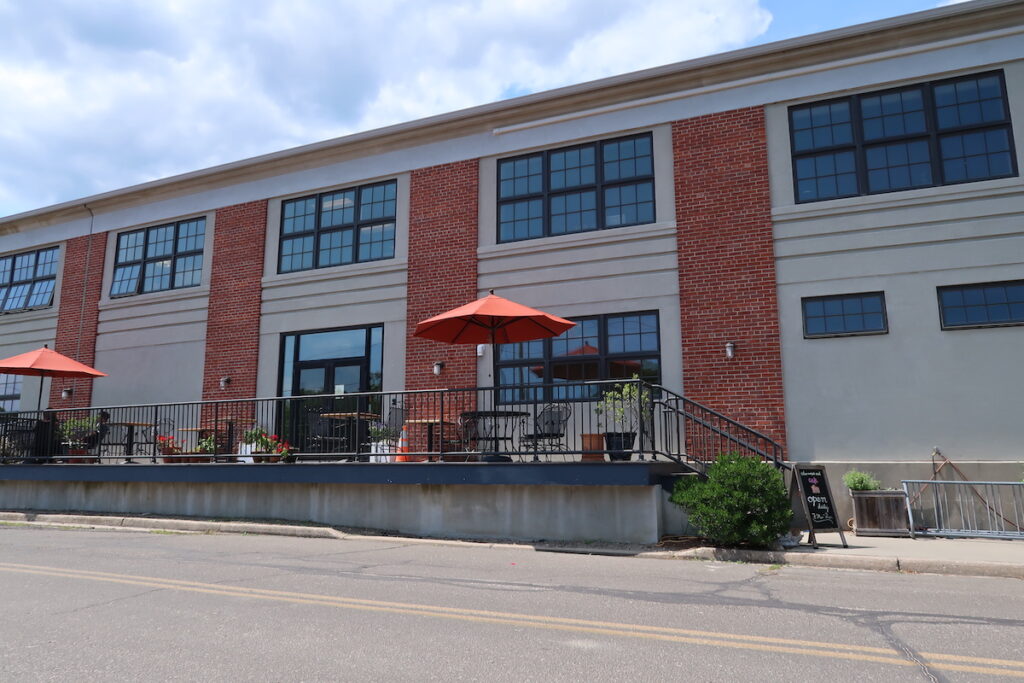Local restaurants, with much smaller staffs, adapt to find ways to stay afloat

Jerry Dicecco never imagined a time where his downtown Riverhead restaurant would be selling cartons of eggs, toilet paper and wholesale produce to stay afloat. But during the coronavirus pandemic, his ingenuity is being put to the test.
Jerry and The Mermaid is one of several area eateries that have expanded their take-out and delivery options to include grocery items. “We’re doing what we can,” Mr. Dicecco said Monday, describing the $50 weekly produce box that the restaurant sold out of last week.
When the outbreak began in early March, the uncertainty amid a state-mandated closure forced Mr. Dicecco to lay off the entire 12-person winter staff. “It affected me mentally,” he said. “We found out we had to close that night and had no idea what to do tomorrow.”
In an open letter sent to President Donald Trump last month, the National Restaurant Association estimated that 5 to 7 million service industry jobs would be disrupted across the country through June.
“We’re just trying to survive,” said Chris Richards, who owns CJ’s Grill in Mattituck with his wife Joanne. “We’re not built for takeout.”
Before the outbreak, CJ’s had 17 employees. Now, it’s just the Richardses and three waitresses: the self-dubbed ‘Corona Crew,’ that continue to work through the pandemic.
Employees in the service industry are entitled to unemployment benefits, which likely provide more than they’d earn working at low hourly wages without customers leaving tips. “They live on their tips,” Mr. Richards said. Some employees simply don’t feel comfortable returning to work, for fear of contracting the virus themselves, if they’re older, or transmitting it to vulnerable family members if they’re younger.
Both Mr. Richards and Mr. Dicecco estimated business to be down 70% of what their usual sales are. Mr. Richards said he was down $37,000 in March and his catering company, East End Events, is also facing a massive blow. With about a dozen weddings cancelled or postponed through June, he predicts over $100,000 in losses.
Between launching the grocery pick-up service and routinely cooking meals to feed first responders and hospital workers on the front lines of the COVID-19 crisis, Mr. Dicecco said he’s been able to offer jobs back to seven employees. “Giving them an opportunity to come back is like the light at the end of the tunnel,” he said.
Across the region, that proverbial light is expected to come in the form of disaster loans and a $2 trillion federal stimulus package to aid small businesses.
“We haven’t gotten a dime yet,” said Jim Liszanckie who together with his wife Sunny runs Sunny’s Riverhead Diner & Grill on Main Street. Since March 16 — the last day the downtown diner was open for dine-in customers — he’s had to let go of 20 employees. “It really hurt to let go of people we’ve been working side by side with for three years,” he said.
A stay-home order continues through at least April 29, inching closer to the part of the year where businesses typically begin turning a profit after operating at a loss all winter.
“Now, we’re contemplating if we’re even going to be open by Memorial Day,” said Tim Martino, who owns Crazy Beans locations in Greenport, Miller Place and Stony Brook with his wife, Callie. “If we can even open our doors in early June, we could salvage some kind of a summer,” he said.
Many agreed the impacts will continue to be felt into the fall, especially if the crisis chips away at any summer revenue.
“Greenport has been like a family since day one,” Mr. Martino said of his staff. “As soon as we get the green light, we are going to bring them back.”
Despite the financial strain, each owner agreed it isn’t all ‘doom and gloom.’ The generosity of regular customers and the community at large is not going unnoticed. “Little things people in the community are doing help us while also paying it forward,” Mr. Richards said.
Leaving a check or $50 bill has become a regular occurrence that has led to hundreds of meals provided to both front-line workers and hungry families across the East End. “It’s a lot of fun to be able to be a part of that kindness,” Mr. Liszanckie said, adding that he’s gotten to know many new faces in the community as people pull together amid the crisis.
Being able to stay open has been a relief for owners and diners alike. “It’s part of what’s keeping people sane,” Mr. Dicecco said. “It makes people happy and gives them some sense of normalcy in a crazy time.”
Mr. Liszanckie is anxious to once again see the diner full of faces and sizzling sounds on the grill behind the counter. The Main Street diner was just starting to turn the corner of success — something that’s seemingly been pulled from under them overnight.
“If we don’t get the help that was promised, then all of this goes away in a couple of weeks,” he said, describing how the help would allow him to pay employees and get the wheels rolling again.
“We put everything on the line,” he said. “But I’ve got my gloves on, and I’m going to fight.”
Mr. Dicecco, who is now running the restaurant his father opened nearly 30 years ago, is encouraging others in the industry to keep the faith. The business applied for similar relief programs in the wake of Superstorm Sandy in 2012. “I know it will come through,” he said. “It does come to fruition, it just takes time. You have to have patience.”








